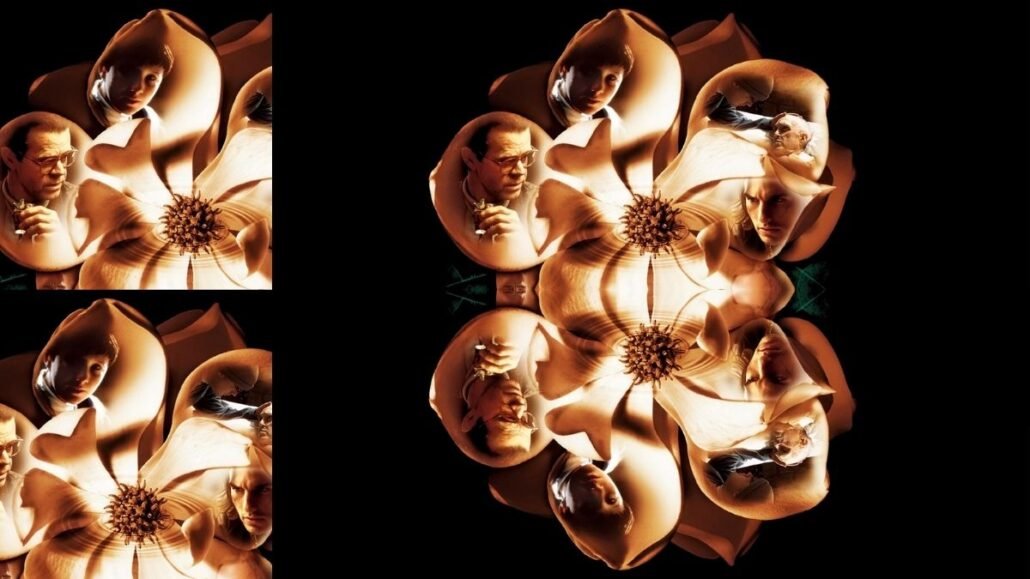Magnolia, 1999, is an epic drama film written and directed by Paul Thomas Anderson. Distributed NewLine Cinema, the movie was a critical and financial success, with a cult following for the director and actors. Regarded as Anderson’s best, his filmography was followed by Punch-Drunk Love, There Will Be Blood and The Master, all critical hits. Magnolia stars Jeremy Blackman, Tom Cruise, Julianne Moore, Philip Seymour Hoffman and William H. Macy, to name a few of the vibrant casting.
Magnolia is a complex, interconnected story happening on a single day, with many characters and their storylines all webbed in a 3-hour screenplay. The story begins with the explanation of the incidents of luck and coincidence, and their deep effects on people’s lives before spinning into the main body.
Plot
Earl Partridge is an aging patriarch, on the verge of dying of cancer, and his comparatively younger wife, Linda, is trying to make amends. He spills to his caretaker nurse, Phil Parma, that he wants to clear his regrets with his estranged son, Frank Mackey. Mackey is a speaker selling his course on tips and tricks to getting girls.
Meanwhile, wunderkind quizzing sensation, Stanley Spector and his teammates are on a record-breaking streak of beating all their adult counterparts on the TV Show ‘What do Kids Know’, but faces struggling questions when struck by a small misfortune. The host of the show, Jimmy Gator, is also hit with cancer, and seeks to settle differences between him and his daughter, who doesn’t talk to him anymore.
Claudia Wilson, Jimmy’s daughter, is also abusing cocaine, and her fight with her dad springs a domestic disturbance complaint from her neighbors. Jim Kurring, an officer who is sent out to check on the same, is star-struck by a high Claudia and asks her out on a date in an intensely sought conversation.
The many confusing stories are all connected in some way or the other, and Anderson appreciates this confusion by prefacing them by real life incidents. He invokes a sense of mess, but alternated between the stories to show that they are innately linked. The eventuality of the associations of the characters and their stories makes Magnolia the masterpiece that it is.
What we liked
Cruise plays the role of Mackey to insane perfection, exploiting his character’s emptiness to the fullest. He delivered with the now famous scene by the bedside of his dying father that eventually became the selling point for the movie.
The acting from everyone in the film was beyond expectation. They were written into emotions of extremes, and they kept the mark up with their performances. The uneasiness, disgust, loneliness, care and guilt are all portrayed raw by the likes of Phillip Baker Hall, Hoffman, Moore, John Reilly and Melora Walters.
The cinematography in Magnolia is more than worth mentioning, carried by intense stare downs by the characters with the camera. The shots always balanced the emotion the character was carrying with its counterpart. For example, Parma’s care for Partridge was always balanced by the anger and hatred of Mackey or Linda. It was more symbolic and stood out in symmetry and equilibrium.
Why watch Magnolia?
Magnolia is a checklist for our emotion, and to let us know we must confront what we feel at some point. It is a post for reflection that intervenes to show that emotions are okay to be felt. With masterful performances from the cast, elevating camera work and transcending music from the technical team, this is a must watch for all enthusiasts.
Although not for the faint-hearted, anyone interested and looking for an entry to Anderson’s work should check this out. For those looking for some light action-adventure, check out Jungle Cruise and Free Guy right here.
